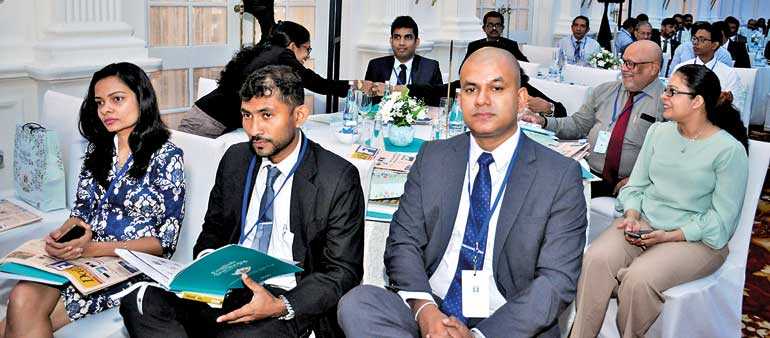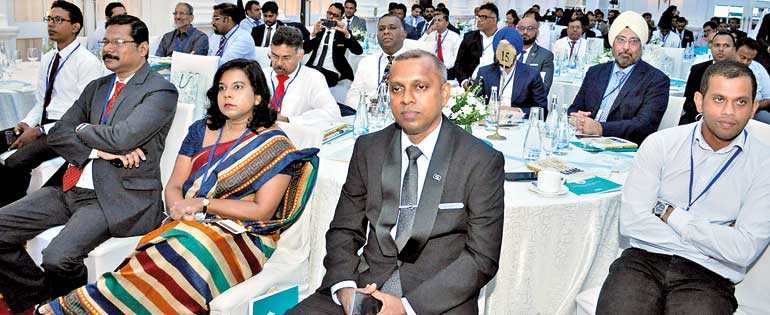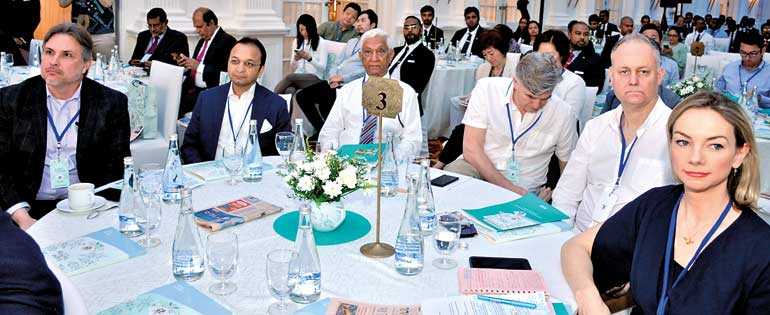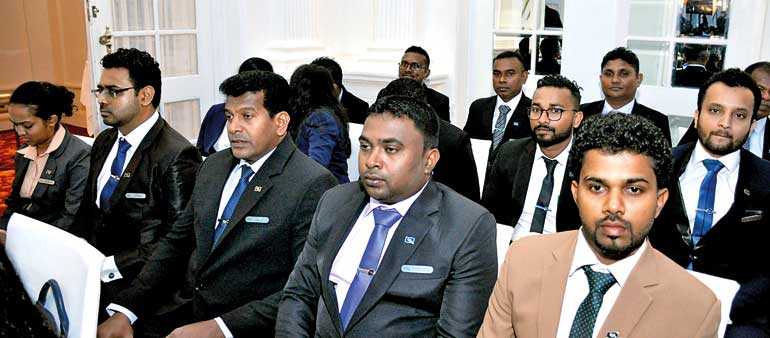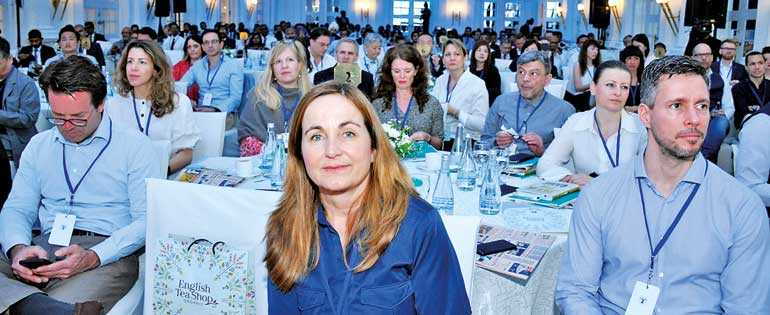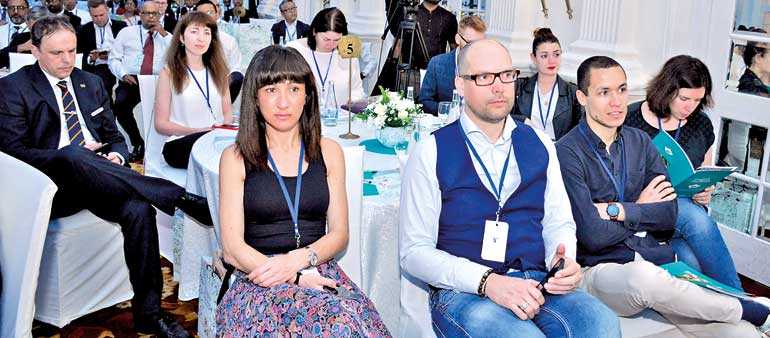Wednesday Feb 25, 2026
Wednesday Feb 25, 2026
Wednesday, 26 February 2020 00:01 - - {{hitsCtrl.values.hits}}
- The English Tea Shop celebrates Sri Lankan ‘Prajava’

By Darshana Abayasingha
Organic Sri Lankan tea export brand, English Tea Shop, presented its shared value platform to stakeholders from around the world in Colombo on Monday, showcasing its business model and how it connects to society.
The company lined up an eminent panel of presenters to highlight the benefits of creating shared value to stakeholders and how it relates to the core of a business going well beyond conventional corporate social responsibility or philanthropy.
During the sessions, the English Tea Shop put forward the word ‘Prajava’ (community) as a meaningful manifestation of the power of communities and how a business goes from thinking itself as part of the community, to being the centre of it. The session also underlined the relevance of Industry 4.0 – the digital revolution which has disrupted livelihoods and business the world over.
The forum’s eminent international and local line-up transformed the programme into an effective management session, discussing timely strategies, concepts and regulations relevant
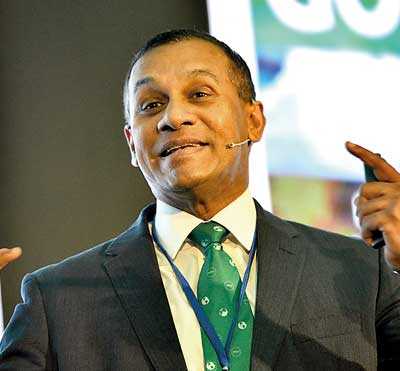 |
| Global Strategic Corporate Sustainability CEO Dr. Ravi Fernando |
across the board both here and overseas.
The sessions were well attended by tea industry representatives, educators marketers and representatives of English Tea Shop’s value chain, and its content would have well served the minds and ears of Sri Lankan law-makers and administrators.
Presenting at the sessions was Rich Armstrong, President of The Great Game of Business and Senior Executive of SRC Holdings Corporation.
Rich detailed how in the last 1970s, International Harvester which then owned SRC had decided to wind down its engagement with SRC and was looking for a buyer if not closure. The executive who was sent to take charge of this winding down operation was taken in by SRC’s people and ethos and went to great lengths to borrow $ 8.9 million over alongside own capital of just $ 100,000 to purchase the company and keep it running. SRC is today a major player in the industrial automotive sector employing over 1,500 people and revenues of $ 500 million.
“What was important at that outset was to make everyone in the organisation understand and know what’s going on. Make them understand the financial reality, by teaching people the financials, opening up and getting them all focused on making the business successful. By doing this the company was able to make it, and even diversify to where we are today. Teach your people how the business works, give them a voice on how it is run and show them the good and the bad. Make them feel like owners of the business,” Armstrong averred – thoughts and actions relevant for business and even nations like Sri Lanka.
Harvard Business School Professor Mark Kramer, author of several influential global publications, spoke next to the audience on the power of the private sector and detailed the potential of Creating Shared Value. He stated the given the scale of resources in the hands of the private sector, it could easily tackle many of the global issues of the day.
Kramer explained that value imparted must be measurable impacts for society and the economic bottom line of the business. It entails three levels encompassing products and markets, increasing productivity across the value chain and thirdly strengthening the clusters or communities in which the company is a part of.
“Shared value creates virtuous cycles. The investment the company makes in solving a social issue actually creates a business that generates more profit for the company, and that gives room and incentive to develop more resources to invest in solving social problems. Some people see creating shared value as the new buzz word for CSR and that really is not the case. We see shared value as a dimension of competitive strategy.”
“It’s a different way of thinking about social investment than the traditional sustainability focus. But it turns out there are opportunities for investors to make more money by identifying companies that create shared value. It is also important investors understand that this cannot be a short-term strategy.”
There are a number of challenges to creating shared value, Kramer said. The first is shifting people’s mindsets, as it is so ingrained in us that when it comes to problems we look to governments and NGOs to solutions. If business is serious about making money, solving social problems is a business opportunity, he says.
Secondly, companies are used to operating in traditional developed markets and averse to taking risks and go serve underserved markets. Also, with respect to measurement ad reporting, companies are very good at reporting their financial results but they are not good at reporting their social impact, he states.
Kramer also advises against “people talking about being the best in the industry, for that’s a mistake. There is no single best product in any given industry, because there are different customers with different needs.”

Global Strategic Corporate Sustainability CEO Dr. Ravi Fernando, touched on the climate crisis and business impacts and revealed to the audience that all signatories to the Paris Convention on Climate Conservation are 67% off target to the commitments made there. This includes Sri Lanka who had undertaken to be up to 30% dependent on renewable energy by this year – 2020.
Dr. Fernando also points out that of the world’s 100 top economic entities, 70 of these were businesses and that businesses were as a result bigger than nations. Accordingly, when we look at global level action or decisions, these businesses must also be considered or looked at. Businesses can do much more than any other entity, even with extreme weather events.
“Some CEOs think CSR is sustainability, only 3% have really embedded sustainability into their corporate strategies and are beginning to create amazing shared value. They must become
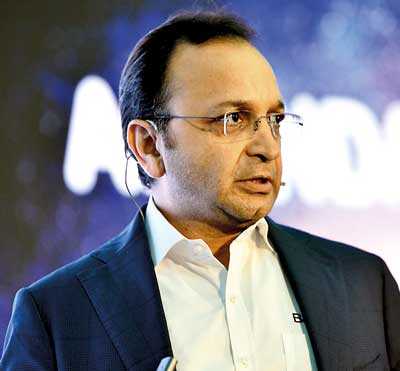 |
| Best Group India Managing Director Nitesh Jain |
part of the solution. Our growth strategies must commit to the environment and social progress. Strategic corporate sustainability is not about how money is spent, but about how money is made. If you proclaim you are spending 2% of profits on good stuff, but the rest is spent on creating problems then you are not part of the solution. What we are talking about today is where 100% of the business model is doing or attempting to do the right thing.”
Dr. Fernando also states that mass agriculture will not be able to circumvent the challenges we face with extreme weather, and that we must look at new models to manage such situations like precision agriculture which uses 90% less resources like water.
The session also featured a panel discussion on how Branding, Marketing and story-telling is affected and shaped by the 4th Industrial Revolution (4IR). The panel hosted by Tasha Marikkar of Dentsu Grant, featured Nick Dorman and Nigel Ritchie, Directors of Echo Brand Designs UK, and Michelle Butler, COO of Spider PR UK.
Butler underscored that much of the millennials state that they want to be associated to brands that champion a cause, so there will be continuous real potential for brands in the sphere and transparency of supply chains is very important. However, the growing shift in consumers moving to take more control of personal data due to privacy issues will also affect some changes in the digital sphere, she says.
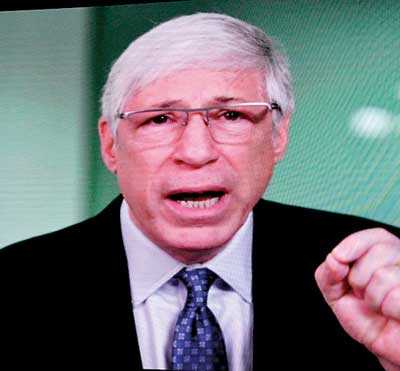 |
| Harvard Business School Professor Mark Kramer |
Dorman and Ritchie underlined the importance of storytelling.
“For us in branding, stories are the most important thing. The story is important and the middle-class consumer is increasingly looking for what is the story behind the brand. Businesses must create circular systems, which is really the solution to the plastic problem for instance. It’s not a single action, it’s a collective. There are a lot of things you can do with business and start encourage circular actions. The quality of produce you make here is amazing, so be confident about it. But, companies in Sri Lanka need to communicate what they are doing. You have something unique here in terms of business and products; it’s yours and yours only and it’s incredibly rich, and it’s just a matter of getting it out there so that people know about it,” Dorman stresses.
Responding to a question raised from the audience on how brands could mitigate crises that can arise out of transparency, Butler avers that it is important to ensure brands constantly put positive messages out into the market, and sometimes industry must come together talk about an pre-empt potential issues and what could be done about it. Outcomes are also heavily dependent on how a company may choose to respond and substantiate what it does to look into them.

A panel discussion on education systems having to change in preparation for 4IR was the highlight of the afternoon as it discussed the current status, necessary reforms and sorry state of Sri Lanka’s education system.
The panel moderated by Prof. Ajantha Dharmasiri, Director of PIM, featured Dr. Tara De Mel, former Secretary Ministry of Education, Andrew Fowler-Watt, Past Principal of Trinity College Kandy, and Prof. Ajith De Alwis, Project Director of the Coordinating Secretariat for Science and Technology and Innovation Sri Lanka.
Opening the session, Dr. Tara De Mel discussed the skills requisite for Sri Lankan youth to be eligible to take on the jobs and challenges of the world in the future which would encompass a great deal of technology. Due to the fast-paced evolution of technology, the world would see more job disruption, increasing socio economic polarisation over and above current levels,
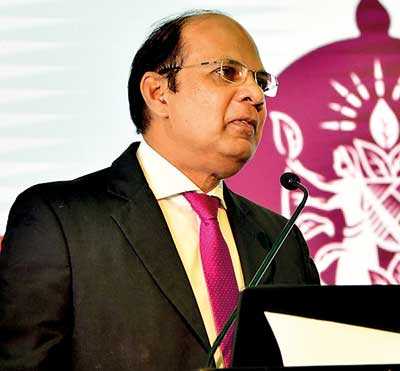 |
| Senior Partner EY Arjuna Herath unveils the ESOP case study for English Tea Shop |
she said. There will be significant demand for a workforce with new skills that we are not ready with.
“To be successful in 4IR we will need to leapfrog into 21st century learning with a mega paradigm shift in primary, secondary and tertiary education in Sri Lanka. We need to shift learning content and the learning experience. With 4IR, standardised teacher-based system of passive learning with memorisation needs to be replaced by student-based active learning, incorporating analytical, creativity, and problem-solving skills. We are looking at innovation and invention versus the old repetition. More than ever the quality of education needs to be seriously re-thought.”
“For today’s children and jobs in the future they will need more EQ rather than IQ, because they will work in a computerised environment. They will need digital skills and social skills, just as much or more than intellectual skills. I would see it a necessity to upgrade the training of all our educators. There is a huge deficit in understanding the urgency of the need to enhance and impart STEM (Science, Technology, Engineering and Mathematics) learning. Only 36,500 students opt for science and about 19,000 in technology in Sri Lanka. Teachers are not being trained or ready for STEM. We are not ready for 4IR. There is very poor English and technology skills amongst educators, and what is worse is we are not self-reflective to see how we stand in the world,” Dr. De Mel laments.
In 2017 Rs. 85 million was allocated to integrate STEM through the National Institute of Education, and to date STEM is still confined to a paper sitting on a shelf and has not made its way inside the classrooms, she says.
Andrew Fowler-Watt was far more candid in his observations on Sri Lanka’s education sector.
“The situation is far worse than she [Dr. De Mel] explained here in Sri Lanka. The tragedy is Sri Lanka had a great education system and it has thrown it away. We are talking of a Fourth Industrial Revolution but we are teaching them to be factory workers, soldiers and servants. Until we change that this country has no chance. It’s a lovely country and young people here deserve so much better. Sri Lankans are as bright and if not brighter than any others, and they are being disgracefully treated by a country that has got its head stuck in the sand.
“It needs the correct people to be listened to rather than side-lined. And the biggest problem is teachers who don’t want to change. They are perfectly happy with the system as it is. On top of that they are so badly paid. A teacher with 30 years teaching experience in Advanced Level Physics is going to be earning less than 300 GBP a month. The standard of teaching is remarkably good given the appalling standards of pay. You have a Bachelor’s Degree and your starting salary is about 160 GBP. If you join a bank with just Advanced Levels and reasonable English, your pay check is three times that. So why would people want to be a teacher, and that is a huge problem for this country. It’s the most important job in the world, because without education there is no future for this country. The people who are going into it now are going in for the wrong reasons, or because they can’t do anything else.
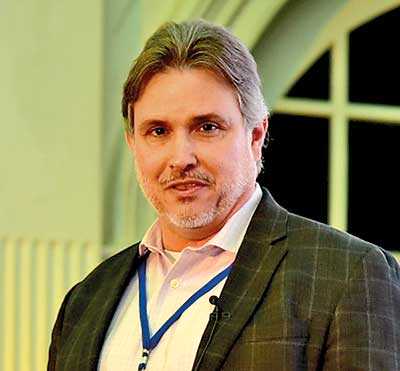 |
| The Great Game of Business President and SRC Holdings Corporation Senior Executive Rich Armstrong |
“However good your resources are, if you don’t have inspirational teachers you are not going to have good students. I’m sure you all remember good teachers who did it for us either at school or university. So, one problem is the teaching, the other problem is the government and not just one government but successive governments. Because changing an education system, particularly when it is so far out of date, it is a long and expensive business. You cannot do it overnight. You have to start at primary and work your way through to university, because there is no point in sending people to university if they are unable to think for themselves. And the local system not only discourages you from thinking for yourself, it actively penalises you if you do.
“The worst exam in the history of the world in my view is called the Grade 5 Scholarship exam in Sri Lanka. Children of nine years who should be playing with friends and family, are stuck in sweaty tuition classes with teachers wielding canes cramming three years of learning for an examination at nine years. It is just horrendous. It goes from bad to worse from that point. Things can change where there is a will. I’m hopeful that the new President who has spent a lot of time overseas might actually realise this and get people who know what they are talking about to help him if not there is no hope, sorry!”
The other horrendous thing about teachers in government schools, he said, is that they can be transferred overnight, and they have no say in it. Therefore, building a team which for him is one of the most important things as a principal cannot happen. Because as soon as a teacher reportedly does well, the teacher is taken away and sent somewhere else.
Professor De Alwis agreed that there is need for urgent reform remarking that “our education system has more holes than a stringhopper”. He also stressed the need to bell the cat regarding tuition as “it is a cancer” amongst Sri Lankan society.
However, he points out that we still have great examples, of educational and technology success like the group that built the electric car in Sri Lanka with 96% of components built and sourced in Sri Lanka, which will rival the likes of Tesla for performance. We also have teams engaged in robotics, AI, and even precision agriculture so there are still good stories despite the problems. But the education system needs to change radically. Only 39% goes to STEM, rest go elsewhere. Looking at jobs of the future, teachers need to impart the right direction and learning skills. This is where our system needs to radically change, he says, and we have to be part of the solution.
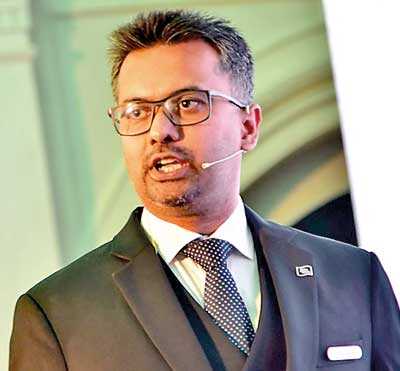 |
| The English Tea Shop’s Director and CEO Suranga Herath |
Prof. De Alwis feels that Sri Lanka can make a change soon enough, even within a short span of 4 – 5 years, as long as decision-makers at different levels can understand the importance of science and technology. Sri Lanka hasn’t still seen science and technology as important and as valuable and a driver for the desired transformation.
Responding to a question on the quality of university education, Fowler-Watt says: “There isn’t a problem with the quality of teaching at universities, but Sri Lanka needs to have a university that can represent to the world. Universities like Peradeniya, Colombo, Moratuwa and Jaffna used to be genuine world class universities. But now, according to latest global ranking the best Sri Lankan university that is Peradeniya, just creeps into the top 2,000 at 1,981. Malaysia alone has 28 universities ranked higher than Peradeniya. Sri Lankans have fantastic abilities, but there has to be a change in our education system at all levels and technology is a must.”
The English Tea Shop’s day-long forum on creating share value successfully reached out to its value chain and stakeholders, educating and engaging them on the attributes and vision of the company. The writer was lucky to pick up some of its produce at a department store in North England and can vouch for the “unique flavours and fantastically diverse range” the brand promises. The company also launched its Employee Share Ownership Plan together with Ernst & Young at the end of the event.
The English Tea Shop’s Director and CEO Suranga Herath spoke to the Daily FT on its vision and purpose with ‘Prajava’ and the future of the company.
“Prajava to me is a word close to our hearts and very central to our business, because I’m seeing this as a massive opportunity for Sri Lankans and Sri Lankan businesses, even for education and livelihoods. We know the power of our communities and how powerful we are when we evolve and come together during crises. We have witnessed this for decades. But what if we use that power to develop value chains in Sri Lanka.”
“4IR tells us that top down innovation from single companies won’t work, and that means you have got to be connecting with other members of the value chain. Creating shared value says you have got to marry society into your value chains. Sri Lanka has the potential to evolve as entire value chains, as connected communities, and take on the world.
“Almost everything at the English Tea Shop is based out of Sri Lanka. We source over 70% of our teas, spices, herbs, ingredients botanicals all from Sri Lanka. We are so rich when it comes to our agriculture base. What we at English Tea Shop have done is we have recreated and renewed that age-old platform of Sri Lankan botanicals in a novel fashion. Businesses should be connecting more to society. It’s an opportune time to promote this globally, and show how people connect to the Prajava.”
Pix by Lasantha Kumara
"Teach your people how the business works, give them a voice on how it is run and show them the good and the bad. Make them feel like owners of the business
– The Great Game of Business President and SRC Holdings Corporation Senior Executive Rich Armstrong
Shared value creates virtuous cycles. The investment the company makes in solving a social issue actually creates a business that generates more profit for the company, and that gives room and incentive to develop more resources to invest in solving social problems. Some people see creating shared value as the new buzz word for CSR and that really is not the case. We see shared value as a dimension of competitive strategy
– Harvard Business School Professor Mark Kramer
Some CEOs think CSR is sustainability, only 3% have really embedded sustainability into their corporate strategies and are beginning to create amazing shared value. They must become part of the solution. Our growth strategies must commit to the environment and social progress. Strategic corporate sustainability is not about how money is spent, but about how money is made. If you proclaim you are spending 2% of profits on good stuff, but the rest is spent on creating problems then you are not part of the solution. What we are talking about today is where 100% of the business model is doing or attempting to do the right thing
– Global Strategic Corporate Sustainability CEO Dr. Ravi Fernando
The quality of produce you make here is amazing, so be confident about it. But, companies in Sri Lanka need to communicate what they are doing. You have something unique here in terms of business and products; it’s yours and yours only and it’s incredibly rich, and it’s just a matter of getting it out there so that people know about it
– Echo Brand Designs UK Director Nick Dorman
It is important to ensure brands constantly put positive messages out into the market, and sometimes industry must come together talk about an pre-empt potential issues and what could be done about it. Outcomes are also heavily dependent on how a company may choose to respond and substantiate what it does to look into them
– Spider PR UK COO Michelle Butler
For today’s children and jobs in the future they will need more EQ rather than IQ, because they will work in a computerised environment. They will need digital skills and social skills, just as much or more than intellectual skills. I would see it a necessity to upgrade the training of all our educators. There is a huge deficit in understanding the urgency of the need to enhance and impart STEM (Science, Technology, Engineering and Mathematics) learning
– Former Ministry of Education Secretary Dr. Tara De Mel
The tragedy is Sri Lanka had a great education system and it has thrown it away. We are talking of a Fourth Industrial Revolution but we are teaching them to be factory workers, soldiers and servants. Until we change that this country has no chance. It’s a lovely country and young people here deserve so much better. Sri Lankans are as bright and if not brighter than any others, and they are being disgracefully treated by a country that has got its head stuck in the sand
– Trinity College Kandy Past Principal Andrew Fowler-Watt
Our education system has more holes than a stringhopper. Tuition is a cancer amongst Sri Lankan society
– COSTI Project Director Prof. Ajith De Alwis
Prajava to me is a word close to our hearts and very central to our business, because I’m seeing this as a massive opportunity for Sri Lankans and Sri Lankan businesses, even for education and livelihoods. We know the power of our communities and how powerful we are when we evolve and come together during crises
– The English Tea Shop’s Director and CEO Suranga Herath"
